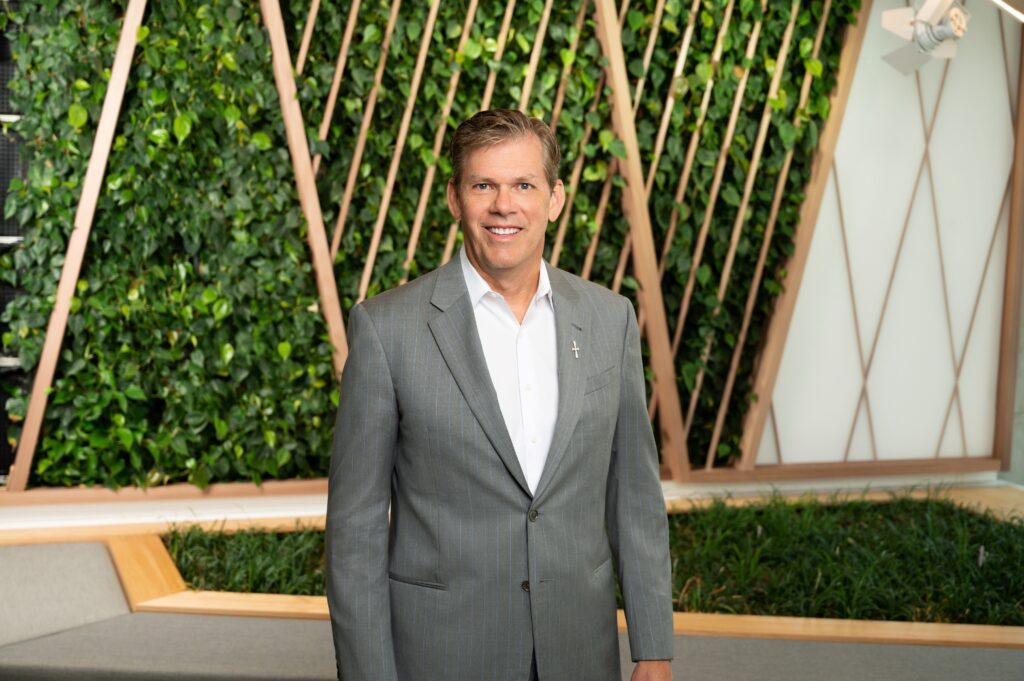Building the Esports Skyscraper

Jason Lake, CEO and founder of Complexity Gaming, on the exponential growth and sky-high future of competitive video gaming
Think esports is just a bunch of kids playing video games? Think again. In 2020, competitive video gaming a billion-dollar industry, and Jason Lake of Complexity Gaming is in the vanguard. Complexity, founded in 2003, was acquired by Jerry Jones and John Goff in 2017 and since then has relocated to Cowboys HQ and rebranded to align with the franchise.
Lake likes to describe his work in the esports industry as “building skyscrapers,” edifices that take considerable time and effort to build, but that generate returns for generations. If you’re unfamiliar with the whole “esports thing,” read on for a crash course—and to find out why every business leader should be paying attention.

Texas CEO Magazine: How did you get into esports to start with?
Lake: I grew up as a football player who was also a video game player. Back in the 1980s, that was kind of a unique thing. You were either a jock or a nerd. But I was a bit of both. I discovered esports around 2002 and saw that competitive video gaming was a thing, and it was the perfect synergy for me. I founded Complexity 16 years ago, in 2003, so I’ve been in esports since the beginning.
Texas CEO Magazine: How do you think about esports? How do you see it fitting into the current landscape?
Lake: Esports is essentially competitive video gaming. It takes the form of organized multiplayer video game competitions between professional players. All esports are video games but not all video games are esports. So the age-old debate has been: “Is this activity a sport?” Personally, I’m not really super interested in that debate. Any time there’s an activity that billions of people around the world enjoy, there’s going to be a certain percentage of those people who like to watch excellence in that activity. Esports is no different. Video games have become ubiquitous to virtually all cultures around the world, so watching excellence in those games is the natural progression.
Texas CEO Magazine: I think a lot of our CEOs would be surprised about the size and scope of the esports market and the amount of money involved.
Lake: Esports is growing quite rapidly. Currently, it’s estimated there’s over 450 million active global fans of esports. Seventy-nine percent of those are under the age of 35. Some estimates have that number ballooning to over 600 million globally in the next couple of years. As far as dollar signs, the esports industry is valued at about $1.1 billion with expectations of it reaching probably $1.8 or $2 billion by 2022. It’s becoming quite mainstream in the digital era, due to the evolution of technology and the growing consumer preference toward new forms of competitive events.
We see traditional rock stars like Post Malone doing different activations with esports teams. You see a cross-collaboration with a lot of notable athletes who all grew up playing video games and admire their professional counterparts in the esports world. You see influencers like Ninja going on Jimmy Fallon regularly. I think esports is becoming ingrained into the sports and media and entertainment culture all around the world. It’s fascinating to be a part of.
Texas CEO Magazine: Is the US kind the leading esports market or are there bigger ones?
Lake: Esports was originally founded in the Korean market, then caught fire in Europe before it really started to grow in the US. If you had to pick one market that’s probably going to be the world’s largest over the next decade, that would be China.
Texas CEO Magazine: You’ve recently associated with a major sports franchise in the Dallas Cowboys. Tell me what that’s been like.
Lake: It’s been fantastic. Complexity was acquired by Jerry Jones and John Goff in 2017. We’re really one of the first ever esports teams to truly be integrated with a sister traditional sports team. Both Complexity and the Cowboys are headquartered at The Star in Frisco, Texas, and that enables us to have seamless coordination and integration with that organization. We work with the legal team, the marketing team, the accountants, the social media team, the coaches, the health and welfare departments, and the charity departments of the Cowboys. We’re really quite integrated across the operations. We have a gaming zone in AT&T Stadium. We set up a gaming trailer at training camp out in Oxnard, California, for the players. Players come through our new headquarters quite often and pick up a hoodie and play video games with us. So I think we’re by far the esports team that’s most integrated with a traditional sports franchise anywhere in the world.

Texas CEO Magazine: Obviously we’ve had esports for a long time, as you mentioned. What do you think is driving the dramatic growth in the last few years?
Lake: Great question. The exponential growth really started with the rise of Twitch, which was a streaming platform that enabled anyone to turn on their mobile device or computer and watch these events live from anywhere in the world. Once that took off and the viewership data was filtering in, we saw an influx of investor cash, which really propelled the industry to a much larger level than it was just five years ago. That exponential growth makes this sector one of the more interesting of any sports entertainment product anywhere in the world.
As the world changes and young people become more sophisticated with what ads they want to consume and what activities they’ve chosen to spend their discretionary income on, gaming time and time again tops those lists. As advertisers and marketers have a harder and harder time reaching new generations through traditional methods of marketing, many of them have found esports to be a quite compelling way to do that.
Texas CEO Magazine: Is there anything particular about Texas that is hot for esports?
Lake: Definitely. Dallas is arguably the second-hottest city for esports in North America next to Los Angeles. For us, the partnership with the Cowboys makes Texas the perfect place. There’s so many synergies. Complexity is able to leverage the existing brand partnerships of the Cowboys and to create a mutually beneficial relationship. We’ve signed top endemic brands [which sell products used directly in esports, such as gaming equipment and energy drinks] and non-endemic brands like MillerCoors, GameStop, Baylor Scott & White, Mamba Sports Academy, and others—and we couldn’t have done that as quickly without the support of the Dallas Cowboys across the street. There are other organizations that have relocated to Dallas as well, and there’s an esports stadium out in Arlington. I think Texas is going to continue to be a very critical place as American esports start to grow out.
Not a whole lot of people necessarily remember this, but Western esports was actually born in Dallas back in the early 2000s. There were a couple of events a year, QuakeCon and CPL, and gamers from all around the world would fly to Dallas and compete. That was in a way the birth of Western esports. So it’s pretty appropriate that all these years later, Dallas is once again a leading center for esports growth in America.
Texas CEO Magazine: Most of us who have kids, we’ve learned the traditional sports ritual—the twice-a-week practices, the games on Saturday, etc. Is the same sort of thing developing in esports? Are there local clubs that kids get involved in?
Lake: There are. First of all, esports is really an umbrella term. Complexity, for example, fields gamers in ten different games right now. Where the Dallas Cowboys play just football, Complexity is in multiple games [such as Counter-Strike: Global Offensive, Call of Duty, Madden, and Fortnite], similar to how a university is in multiple sports year-round. Each game has its own ecosystem, with its own fanbase and player base.
Generally speaking, one of the more interesting things we’ve seen over the past 24 months is the rise of collegiate esports and scholarships, which has then filtered down to high school esports programs because of course if you can qualify for a scholarship via any activity, high schools are interested in that for their students.
So whereas traditional sports started at the grassroots level and then grew up to the pro level, esports grew backwards. We started at the pro level and just now we’re establishing our root system down into college and high school esports. All the major universities around Texas, to the best of my knowledge, are exploring or have already started esports programs, many of which include scholarships.
Texas CEO Magazine: What’s the future of esports?
Lake: We’re creating multigenerational billion-dollar sports properties for teams like Complexity. The phrase I use is “We’re building skyscrapers,” and skyscrapers take time and money to build, but then they return revenue for generations. Once they’re built out, the top esports franchises like Complexity are going to experience similar fandom and international stardom to the Dallas Cowboys, the Los Angeles Lakers, the New York Yankees. It’s a digital sport for a digital era. As we look around ourselves, we have supercomputers in our pockets and electric cars that drive themselves. Esports are part of that transformation.
I think anyone who overlooks esports or derides it as silly video games for young people is really missing the trajectory of the future. I like to say, like Gretzky, that you want to skate to where the puck is going, not to where the puck is. If you’re taking a good look, in the entertainment and sports worlds, it’s pretty obvious to all observers that the puck is moving toward esports.
Texas CEO Magazine: Is the biggest misconception about esports that it’s just a bunch of kids playing video games?
Lake: Yeah. The age-old perception by people who don’t educate themselves is that all esports players and fans are 25-year-old boys living in their parents’ basements, with very unhealthy lifestyles with no social lives. Nothing could be further from the truth. Many of our professionals were all-state sports athletes when they were in high school. Our entire narrative and mission moving forward is centered around the health and welfare and performance of our gamers.
Our gamers live in luxury apartments about a mile from where I’m sitting. They have breakfast and lunch five days a week at the Dallas Cowboys training table, which is the same place the players get their nutrition. They have free memberships to Cowboys Fit gym here on the property. They have physicals and preventative medical care at the Baylor Scott & White sports therapy hospital, also on the property. Then they have the opportunity to come over and train in what is probably the world’s best headquarters.
When most people come to visit us, I think they expect to walk into a room with a lot of computers and some neon lights. But we’ve built out a next-generation esports infrastructure system that closely mimics traditional sports, including how they care for the whole wellbeing of their athletes. We call this esports 3.0. We’re really proud to be at the forefront of it.

Texas CEO Magazine: Is there a Super Bowl of esports in the United States that people should be aware of?
Lake: Since esports is an umbrella term that encompasses multiple games, each gaming title for the most part has its own system. Some are franchise systems where there’s an upfront cost of up to $40 million to own a franchise, and some are open ecosystems. So each game has its own structure and its own “Super Bowl.” League of Legends is generally considered the world’s largest esport, and they host their world finals at different locations around the planet each year. Millions of people at home also tune in and watch. It’s a very interesting space to be in because it’s really 24/7/365. And since different cultures celebrate different holidays, I generally work a bit on Christmas Day. It’s nonstop. It’s very global. We spend a lot of time on airplanes. It’s a very exciting space to be a CEO in.
Texas CEO Magazine: This is not a virtual in the sense that people are all congregated in the same location for the event, correct?
Lake: Yes, absolutely. The teams or the players go to the location, say a stadium. The fans buy tickets and concessions just like a traditional sporting event. There are giant screens where you can watch the players play, and that is also broadcast around the world on Twitch or YouTube or other streaming platforms. The thing I find with older folks who start investigating our space is they don’t understand the attraction of going to a stadium to watch people play video games. I say, “Well, you like to play basketball and you drive to a stadium and drink a beer and watch Luka Dončić play. It’s basically the same thing.”
At its core, video gaming—and this is what a lot of people don’t understand—is a very social and community-based activity. When my son gets home from school, he doesn’t hop on a computer and play by himself. He hops on a computer to play with his friends from around America. This is where they socialize, where they learn teamwork, where they learn leadership.
When you have a large stadium event, it’s a really unique opportunity to go out and meet all these other people who are passionate about the same game, the same tournament you are—and maybe have some nachos and a bottled water and enjoy the event. These events can pack out 10-, 20-, 30-, 40-, or 50,000 people at cities around the world.
Texas CEO Magazine: Where would I go to find an event like this in Texas?
Lake: We typically have three to four mid-sized of events here in Dallas a year. Since we have the Ford Center here at The Star that seats up to 16,000 people, I’m always speaking with event organizers, looking to bring more esports to the great state of Texas.
Texas CEO Magazine: From an advertising perspective, what should a CEO interested in reaching your market do?
Lake: Esports fan engagement is massive, both online and offline. As I said, the global esports audience is projected to grow to upwards of 600 million in the next year. Brands recognize that large audience. It’s an audience that’s very difficult to reach via traditional means, because they’re not sitting down and watching traditional sports like they used to. They’re computer savvy, generally college educated, generally middle class, and they also use ad blockers because they don’t like to be bothered by ads.
The question as a savvy advertiser or marketer is “How do I reach this generation before they start developing brand loyalties?” Esports is definitely a viable vehicle for that. You can meet the community and these new consumers in an area they’re passionate about. A lot of companies that have done so early have reaped great benefits. We’re seeing a virtual who’s who of blue-chip corporate America getting involved in some level at this point.
Texas CEO Magazine: Any parting advice for CEOs?
Lake: My advice to any leader who looks at the esports space and rolls their eyes or would like to ignore it is to have an open mind. The world is changing very quickly, and it’s only a matter of time until esports intersect with your business in some way, shape, or form. Have at least a cursory understanding of the space. That’s just common due diligence for a leader today.





